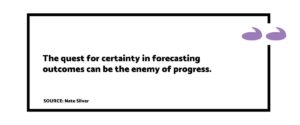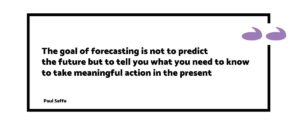15 Jun The Incredible Role of Sales Forecasts in Your Business Success
Sales forecasts are crucial for all businesses, at every stages of your business. For new start-ups, they form a vital part of your business plan that can help secure lending and helps you to understand the amount of additional cash you’ll need to get going and keep going. For more established businesses sales forecasts are crucial to your predictions of short- and long-term performance and are tied into almost every aspects of your business. Sales forecasting impacts financial planning, your marketing budget, operations planning, manufacturing, stock rotations, purchase requirements, staffing levels, customer service demand and your delivery and fulfilment capability.
Given their far-reaching impact, it’s crucial that the information contained in your sales forecast is as accurate a reflection of the future as possible. That said as none of us (yet) have a time machine or the ability to look into the future with 20/20 accuracy your sales forecast can only ever be “your best possible estimate at this moment in time”. Don’t let the fear of getting it wrong stand in the way of producing your sales forecast. Sales forecasting is definitely a case of practise makes perfect. The sooner you start the better you’ll get.

The inability to create a perfect forecast scenario doesn’t make them any less valid. Even if it turned out all your sales forecasts are wrong, and with a start up, they may well be, it’s nevertheless important that you’ve thought through all the factors that a significant up, or down turn in forecasted sales volume would have on the wider business.

If your sales forecast is predicting a significant upturn with a 30% growth in sales then, as you can imagine, this will potentially have a major impact across the business from the sales team itself to the acquisition and delivery of your product to service customer service. That in turn will impact your staffing levels and the financial resource required to fund such a growth and the associated infrastructure to enable it.
Advance notice of such a change via your sales forecast will not only enable you to meet the additional customer demand smoothly and efficiently, it’ll keep your costs under control and ease frustrations within the business. When you hear a sales teams bemoaning “you’d think they’d be appreciative of the extra business we won, instead all everyone does is moan, what’s the point?” You can be sure the sales forecasting system is broken, and the rest of the business is drowning under an unexpected tsunami of new business.
It’s particularly alarming when the new business is the result of (easily predictable) promotions and discounts yet results in heavy overtime requirements and additional delivery costs due to the short-term nature of the demand. Worst of all is the risk of longer-term costs to your business from delays, poor customer service even reduced quality if the unforeseen deluge of demand isn’t miraculously dealt with.

Most businesses draw up a sales forecast once a year with a month-by-month forecast of the sales you expect to achieve. Sales forecasting is often a “guess-timation,” at best it’s an estimation. And that’s OK. Your level of accuracy will grow. Of course, accuracy is dependent on the forecasting methodology you choose for your market, the data you gather and the factors that you consider. Regardless of maths and science behind your sales forecast, it still holds true that garbage in = garbage out. The better the data you use, the closer to reality your business forecasts will be. We’ll consider these aspects further in future posts.
Your sales forecast is a crucial element to your business success.
Don’t worry if the idea of sales forecasting seems a bit daunting. Even a poor sales forecast gives you a start; an established point against which to measure your actual performance. Once you have a forecast with reasonable stability (even if it’s consistently wrong) you can stay ahead and make the necessary adjustments to your business to compensate for higher or lower actuals compared to your sales forecast predictions. With your sales forecast in hand you can now plan for the future, grow revenue, reduce expenses, and thrive in the long term; setting you up to get ahead of the field.

